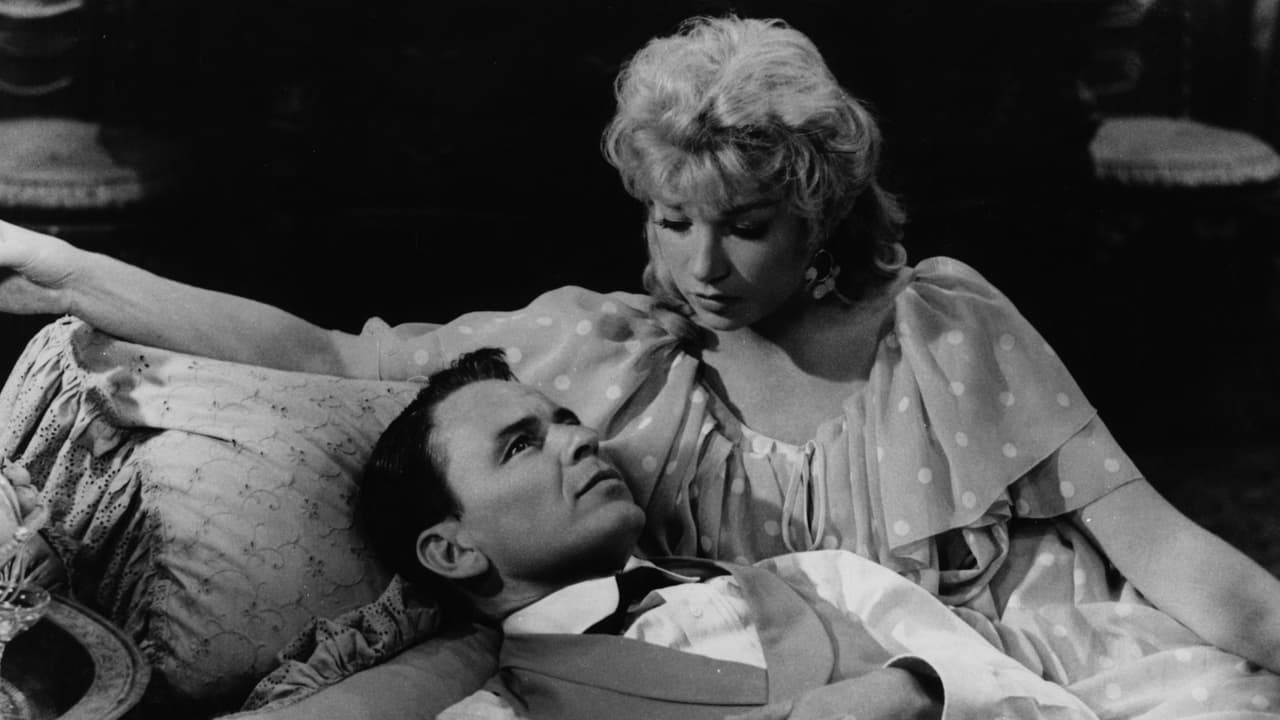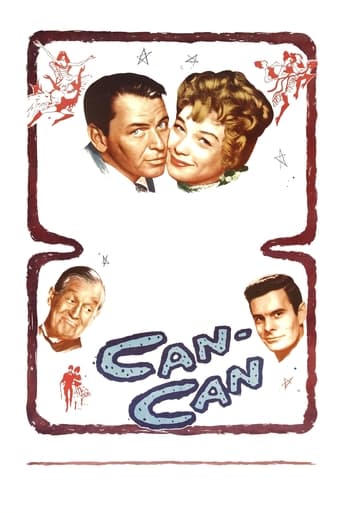

one of my absolute favorites!
... View Morejust watch it!
... View MoreAt first rather annoying in its heavy emphasis on reenactments, this movie ultimately proves fascinating, simply because the complicated, highly dramatic tale it tells still almost defies belief.
... View MoreOne of the film's great tricks is that, for a time, you think it will go down a rabbit hole of unrealistic glorification.
... View MoreI am not a student of film, but I enjoyed it. Different people have different tastes, therefore different likes and dislikes. I think any "reviewer" that look for nits to pick an/or technicalities to point out, especially in older movies, should make his/her own movies. In addition, I don't think a review is valid if it is based on a personal dislike of of someone in the movie. Why does it matter if a movie follows a book to the letter, unless it claimed to follow the book? I think movies are mostly for entertainment and/or story telling. If it claims to be based on facts, then nit-pick, if it isn't factual. Otherwise, it is for entertaining the viewer.
... View MoreReading through the reviews for "Can-Can" is a strange experience as they are all over the place. Some loved it and give it glowing reviews and just as many hated it. It's a bit unusual to see such divergent reviews and my assessment of the film is somewhere in the middle--it's not a good nor a bad film--just a second-rate musical that isn't bad as a time-passer.When the film begins, most viewers will probably be surprised to see Shirley MacLaine and Frank Sinatra in the leads. This is because the film is set in Paris and they are about as French as gefilte fish! This inappropriate casting is made more obvious since Louis Jourdan and Maurice Chevalier are 3rd and 4th billed! So, automatically, the film loses a point for such poor casting. It's a shame, but Hollywood SHOULD have been more focused on appropriate casting than on getting big-name stars--problems that did NOT plague a much better musical from the same period, "Gigi" (which starred Jourdan and Chevalier among others).MacLaine plays Simone--a woman who runs a night club in Montmartre (a district in Paris known for its adult entertainment). Her place has gotten in trouble for having Can-Can dancers*--and police have vowed to arrest her if they put on that wicked dance again. Well, eventually this does occur, although the charges are soon dropped by the prosecutor, Philipe (Jourdan). Why? Because Philipe has fallen in love with her and wants to marry her. This is a VERY weak aspect of the film, as the upper-class Philipe doesn't even know this lady--so why would he be willing to destroy his career for a dance hall girl?! Eventually, Simone agrees to marry Philipe. However, Philipe's friend (Chevalier) and Simone's ex-lover, François (Sinatra) don't want the marriage to occur and so they conspire to break up the couple. They invite the cream of society to an engagement party, get Simone drunk and get her to entertain her guests. Well, although Philipe STILL inexplicably wants to marry her, Simone is determined to end this relationship.As for François, his character is...well...annoying. He wants Simone but is very honest in his wicked intentions. He has no desire to marry her but wants her, so he breaks up her marriage. This is pretty sleazy and the song he sings about this is pretty nasty as well. So, because of this, the film's ending REALLY made no sense at all...none.In addition to a confusing and occasionally unbelievable plot, the film features a very mixed bag of music. Some is great--such as "It's All Right With Me" and "You Do Something to Me". However, much of the rest of the music is sub-par--particularly the lyrics. It's like they got Cole Porter's second-best not his best for this movie.As for the dancing, this was VERY odd. Despite the title of the film, there is almost no Can-Can dancing in the film. However, and this just shows you how out of touch Hollywood could be, there is LOTS of modern dance--the sort of stuff you'd NEVER see in 1898. In particular, the violent dance number involving the knife is pure Hollywood and has no place in the film, though there are several other numbers that just don't belong in the movie.Overall, the film is a seriously mixed bag. The plot isn't terrible but it often makes little sense, the songs range from awful to terrific and the dance numbers often aren't appropriate to the film. I think it's a tepid little film that SHOULD have been much better.*According to IMDb trivia, the reason the Can-Can was so scandalous was because the dancing girls did NOT wear underwear. Although Wikipedia can occasionally be unreliable, it insists that this is an urban legend and the dancers certainly DID wear underwear.
... View MoreAfter his greatest stage success (KISS ME KATE) Cole Porter entered the last decade and a half of his life with a track record of hit and miss musicals. It was not that he lost his abilities to compose great songs. It was that not everything he touched turned to gold.The "gold" of this decade was his music for SILK STOCKINGS (his version of NINOTCHKA) and his musical CAN-CAN. His misses included OUT OF THIS WORLD, his attempt at a modern retelling of the Amphitryon myth from Greece. OUT OF THIS WORLD has entered the history of Broadway as a potentially great musical that was too advanced for its period. Apparently much of the musical involved homosexual as well as heterosexual sex (in keeping with ancient Greek culture both forms of love were acceptable). Unfortunately they were not acceptable in 1950 New York City (and one may add in 2008 California and elsewhere). Only one number from OUT OF THIS WORLD survived: FROM THIS MOMENT ON. It got grafted into the film version of KISS ME KATE.It is a tradition that none of Porter's scores survived totally intact in Hollywood. Songs were dropped from films or pushed into others. So CAN-CAN has Let's Do It in the film score, although it was not in the musical (it was over thirty years old by that time), and yet I LOVE Paris, Porter's greatest anthem to the foreign city he adored above all others, was dropped from the film. Still there is enough Porter in this film to appreciate his best work. And as was said in another review, Sinatra's singing "But It's All Right With Me" to Juliet Prowse happens to be quite the best moment for old "Blue Eyes" in the film.The film tried to capitalize on the success (two years before) of GIGI, by reuniting Maurice Chevalier and Louis Jourdan from that film with Sinatra, and fellow rat-packers Shirley MacLaine and Prowse. Set again in the France of the 1890s, here we are not watching a young girl blossom into womanhood and win the man of her dreams, but we are watching the sleazier theatrical world of the day in the Montmartre District*. For MacLaine runs a dance hall/bar that has the town in a tizzy due to the dancing of the "forbidden" can-can by the dance hall girls. MacLaine's partner is her lawyer (and lover) Sinatra. When a bunch of reformers cause a raid on the dance hall, they just miss arresting Sinatra, MacLaine, and a corrupt (or friendly) jurist played by Chevalier. MacLaine has to appear in court, and the judge there is Jourdan, who is known to be incorruptible. He is, but he falls for MacLaine. It enables Sinatra to beat the legal attack temporarily, but it leaves MacLaine with a lovesick Jourdan to worry about.(*GIGI is not the only recent film that has an influence on CAN-CAN. The Montmartre area is where Toulouse - Lautrec and other painters of that period resided. The color of Huston's MOULIN ROUGE (1953) and the background of the cabarets Toulouse - Lautrec went to is evident in the film too. However, there even is a little joke (no pun intended). While singing the opening song "Montmartre", Sinatra is in the street, and passes Toulouse - Lautrec holding one of his canvasses. Toulouse - Lautrec shows it to Sinatra, who looks at it, and says, "It'll never sell!")The film follows MacLaine trying to get a commitment from Sinatra that will make their sexual relationship permanent, but he is too independent. So she is slowly finding the interest of Jourdan a kind of refreshing alternative (although she does suspect it just cannot work). Chevalier is pleased to see this troublesomely honest protégé of his somewhat corrupted so that he won't interfere with the business at the dance hall, but he realizes that Jourdan is serious enough to consider marrying MacLaine, and ruining his career. Their duet ("Your Business is Your Business, and My Business is Mine.") is not one of the best recalled Porter tunes, but it is a bouncy enough one, and it certainly illustrates Chevalier's realization that what was previously a useful slip by Jourdan is now totally out of hand.The conclusion of the film is set in the dance hall, where the puritan critics are given a demonstration of the sinful dance, and discover it has a charm and excitement they had not expected. The dance sequence at the end was the only time that MacLaine (a pretty affective dancer before she became an actress) shared film dance time with Prowse. Juliet Prowse was a mediocre actress at best (see my review of MONA MCCLUSKY, her attempt at a sit com), but she was a first rate dancer, and the production number of her and MacLaine leading the Can-Can is quite memorable. The number is a fine way to end the film, and also for it to enter diplomatic history. As pointed out elsewhere on this thread, Khrustchev was touring Hollywood when they were shooting Can-Can, and watched the dance number being shot. He did condemn the film as proof of the decadence of the west. However, that did not prevent him from having his photo taken with Sinatra and MacLaine. I guess there is decadence and there is decadence.
... View MoreA recent NYC concert version of CAN-CAN (w/ a superb Patti LaPone) revealed a reasonably sturdy book & an underrated late Cole Porter score. Where had it been hiding all these years? Perhaps the vanishing act can be blamed on this inept film version which mangles the plot, throws away two-thirds of the score (even 'I Love Paris' is stiffed) and has all the French flavor of a Burger King croissant. Louis Jourdan and Maurice Chevalier show up to provide Gallic seasoning (Jourdan does his numbers charmingly and has far more rapport with Shirley MacLaine than his victorious rival, Frank Sinatra, while Chevalier's intro to 'Just One of Those Things' is the best thing in the film), but Minnelli's GIGI, Huston's MOULIN ROUGE and Renoir's FRENCH CAN CAN are each in their own way infinitely superior to this malarkey.NOTE: It takes a lot of chutzpah to include a DVD-extra tribute to writer Abe Burrows on a pic that utterly trashes his work on the original stage show.
... View More